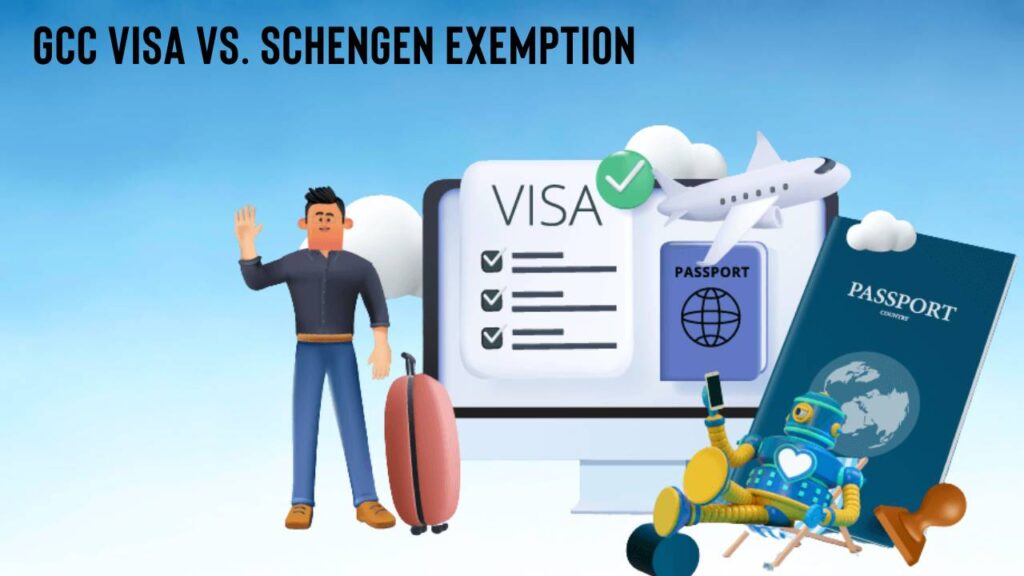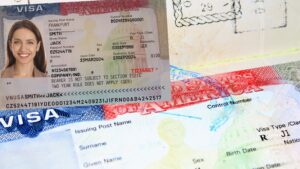Travel has become an integral part of both professional and personal life, with millions of people moving across borders every day for tourism, business, education, and family visits. Ability to enter different countries without facing strict visa requirements often depends on regional agreements and bilateral arrangements. Two such arrangements that stand out for travelers are the GCC Visa vs. Schengen Exemption — in the Middle East and Europe, respectively.
While both aim to make travel more accessible and convenient, they function under different frameworks and cater to different geographic regions. Understanding how these systems work, their benefits, and their limitations can help travelers make informed decisions and plan trips more efficiently.
What is a GCC Visa?
The GCC Visa is a travel document or electronic authorization that allows entry into a GCC member state without going through the full visa application process required for outsiders. The Gulf Cooperation Council, established in 1981, includes Saudi Arabia, the United Arab Emirates, Qatar, Kuwait, Oman, and Bahrain. Over the years, these nations have worked to create smoother travel arrangements for their citizens and, to some extent, for expatriates who contribute significantly to their economies.
A key feature of the GCC Visa is that it caters primarily to residents of other GCC countries. For example, an Indian national living in Dubai with a UAE residence permit may be eligible for a short-term visa to visit Qatar or Oman without having to apply from their home country. The process typically involves submitting an online application, providing proof of GCC residency, passport details, and sometimes evidence of hotel bookings or return flights.
Most GCC countries issue these visas for purposes like tourism, attending family events, or short-term business trips. Durations vary, often ranging from 14 to 30 days, and overstaying can lead to fines or travel bans. For business professionals and leisure travelers within the Gulf, the GCC Visa greatly reduces paperwork and encourages more regional exploration.
What is the Schengen Exemption?
The Schengen exemption is a privilege granted to citizens of specific countries, allowing them to enter the Schengen Area—a bloc of 27 European nations—with no need for a formal visa for short stays. This policy emerged from Europe’s commitment to free movement within its borders, enabling eligible travelers to enjoy multiple countries under a single entry clearance.
The list of countries benefiting from this exemption includes the United States, Canada, Japan, Australia, Singapore, and many more. Citizens of these nations can enter any Schengen member state for up to 90 days within a rolling 180-day period. This allows them to move freely between countries like France, Germany, Italy, and Spain without facing additional immigration checks at internal borders.
While the exemption is highly convenient, it is not an unlimited pass. Travelers must respect the 90/180-day rule and cannot work without the appropriate permit. Starting in 2025, the European Union will introduce ETIAS (European Travel Information and Authorisation System), requiring exempt travelers to complete a short online registration and pay a small fee before departure. This move aims to enhance border security while maintaining the ease of travel that the Schengen exemption currently offers.
GCC Visa vs. Schengen Exemption: Key Comparisons
Although both systems promote regional mobility, the GCC Visa and Schengen exemption differ in several important aspects.
- Geographic Coverage: The GCC Visa applies to six Gulf countries, while the Schengen exemption covers 27 European nations. This means the Schengen system offers broader travel diversity, but the GCC Visa provides targeted access within a concentrated economic zone.
- Eligibility Rules: The GCC Visa is often limited to expatriates with valid residence permits in a GCC country. The Schengen exemption, on the other hand, is based on citizenship, meaning it applies to entire national populations rather than specific residency statuses.
- Application Process: A GCC Visa typically requires an online or embassy application, even if simplified, whereas the Schengen exemption currently requires no pre-travel process (though ETIAS will change that).
- Stay Duration: GCC Visas are usually valid for 14–30 days, while the Schengen exemption allows 90 days in any 180-day period.
- Internal Movement: Both allow free movement within the bloc once you’ve entered through one member state—though in the GCC, movement between countries may still involve short border checks.
This comparison shows that while the Schengen exemption offers more extensive travel freedom across a large geographic area, the GCC Visa plays a crucial role in connecting Gulf nations that rely heavily on expatriate mobility.
Benefits of the GCC Visa
The GCC Visa provides unique advantages for travelers within the Middle East. For expatriates, it’s a cost-effective way to explore neighboring countries without the lengthy processing times typical of standard visas. This is particularly beneficial for the millions of foreign professionals working in Gulf countries, from engineers in Qatar to teachers in Kuwait.
From a business perspective, the GCC Visa fosters stronger commercial ties. Conferences, exhibitions, and business meetings often take place in different Gulf capitals, and the ability to travel quickly between them boosts economic cooperation. For tourists, it opens the door to a variety of experiences—shopping in Dubai, diving in Oman, or enjoying cultural festivals in Bahrain—all with minimal bureaucratic barriers.
Moreover, the GCC Visa encourages regional tourism, which supports local economies. The ease of applying online, combined with relatively quick approval times, makes it an attractive option for last-minute trips.
Benefits of the Schengen Exemption
The Schengen exemption is highly valued by frequent travelers and tourism enthusiasts. The ability to visit multiple European countries on a single trip without separate visa applications saves both time and money. A traveler could have breakfast in Paris, take a train to Brussels for lunch, and end the day in Amsterdam—all without ever presenting their passport at an internal border.
For business professionals, this exemption is equally beneficial. Attending trade fairs, meeting clients, or exploring new markets becomes more feasible when travel is hassle-free. Students also benefit, as they can attend short-term courses or cultural exchange programs without applying for a visa.
Another advantage is the flexibility it provides for itinerary changes. If you’re exploring Europe and decide to add another country to your trip, you can do so without worrying about visa requirements—provided you remain within the 90/180-day limit.
Limitations and Challenges of GCC Visa & Schengen Exemption
Despite their advantages, both systems come with limitations that travelers must keep in mind.
For the GCC Visa, eligibility is a major barrier—tourists from outside the GCC who do not reside in a Gulf country cannot benefit from the simplified process. Additionally, some GCC states impose extra requirements, such as proof of hotel bookings, specific professions listed on the residency permit, or minimum passport validity. Overstaying can result in significant fines or even deportation.
The Schengen exemption’s main challenge lies in the strict 90/180-day rule, which requires travelers to carefully track their days in the region. Violations can lead to entry bans. With the upcoming ETIAS system, even exempt travelers will need to complete an online application, meaning it won’t be entirely “visa-free” anymore.
Which Option Works Best for You?
Choosing between the GCC Visa and Schengen exemption depends largely on your base location, nationality, and travel goals.
If you are an expatriate in the Gulf looking to explore the region for business or leisure, the GCC Visa is the obvious choice. It allows you to attend regional events, explore neighboring attractions, and build business connections without extensive paperwork.
On the other hand, if your focus is on European travel and you hold a passport from a Schengen-exempt country, the exemption offers unparalleled travel freedom. It’s particularly useful for travelers planning multi-country itineraries in Europe, where borders are virtually invisible.
Future Developments in Travel Policies
Travel policies are evolving in both regions to balance convenience with security. The GCC is increasingly moving towards integrated digital systems, which could eventually allow travelers to apply for a single regional visa covering multiple member states in one go. Such a move would mirror the convenience of the Schengen system, albeit within the Gulf.
In Europe, ETIAS will add a layer of pre-screening for exempt travelers. While it introduces a minor administrative step, it’s designed to enhance safety and ensure smoother border processes in the long term. Both changes signal that while global travel is becoming more streamlined, it will also remain closely monitored for security purposes.
FAQs
1. What is the GCC Visa and who can apply for it?
The GCC Visa is a travel document or electronic authorization that allows entry into a member state of the Gulf Cooperation Council (Saudi Arabia, UAE, Qatar, Kuwait, Oman, and Bahrain) without a full visa process. It is typically available to expatriates who hold valid residence permits in one GCC country.
2. Which countries are included in the GCC Visa system?
The GCC Visa covers six Middle Eastern nations: Saudi Arabia, the United Arab Emirates, Qatar, Kuwait, Oman, and Bahrain. Each country has its own rules on eligibility, permitted activities, and duration of stay.
3. What is the Schengen exemption?
The Schengen exemption allows citizens of certain countries—such as the USA, Canada, Japan, and Australia—to enter the Schengen Area without a visa for short stays (up to 90 days within a 180-day period) for tourism, business, or family visits.
4. How long can I stay with a GCC Visa compared to the Schengen exemption?
A GCC Visa is usually valid for 14 to 30 days depending on the country issuing it. The Schengen exemption allows up to 90 days in a 180-day period across all Schengen member states.
5. Do I need to apply in advance for both?
For the GCC Visa, most travelers must apply in advance online or through an embassy, even though the process is faster for eligible residents. The Schengen exemption currently requires no application for eligible travelers, but starting in 2025, ETIAS pre-registration will be mandatory.
6. Can I work with a GCC Visa or under the Schengen exemption?
No. Neither the GCC Visa nor the Schengen exemption permits paid employment. Travelers must obtain separate work permits or long-term visas if they intend to work in these regions.
7. Can I travel freely between countries within each region?
Yes, with some differences. Under the Schengen exemption, you can move between Schengen countries without border checks. Under the GCC Visa, movement between countries is allowed if you have entry permission for each, but you may still face passport checks at some borders.
8. What documents are required for a GCC Visa application?
Generally, applicants need a valid passport, GCC residence permit, proof of onward or return travel, hotel booking confirmation, and sometimes evidence of sufficient funds. Requirements vary by country, so it’s important to check with the relevant embassy or e-visa portal.
9. What happens if I overstay my GCC Visa or Schengen exemption period?
Overstaying can lead to heavy fines, deportation, or future entry bans. In the Schengen Area, overstaying beyond the 90/180-day rule can result in being flagged in the Schengen Information System, which could affect future travel to Europe.
10. Which is better for me: GCC Visa or Schengen exemption?
It depends on your base location and travel goals. If you live in the Gulf or frequently travel within the Middle East, the GCC Visa is more practical. If you hold a passport from a Schengen-exempt country and want to explore Europe, the Schengen exemption offers greater geographic diversity and flexibility.






